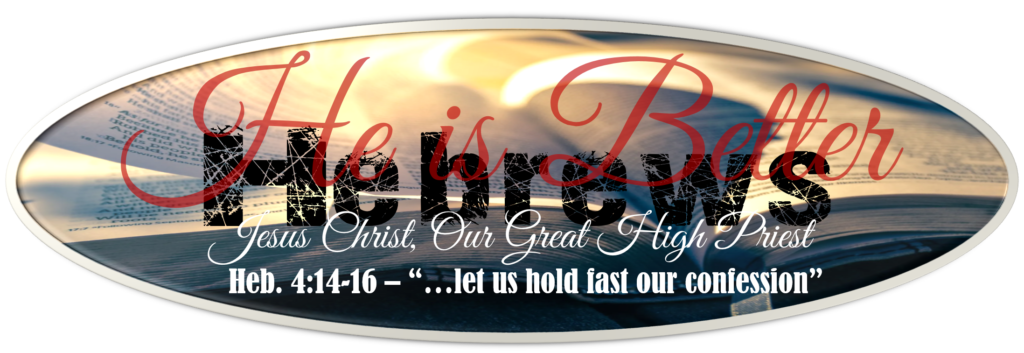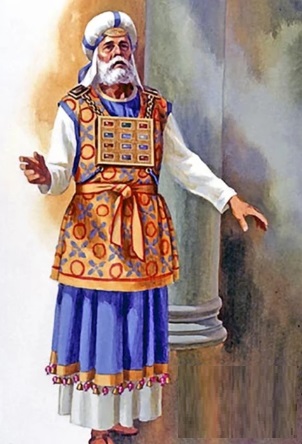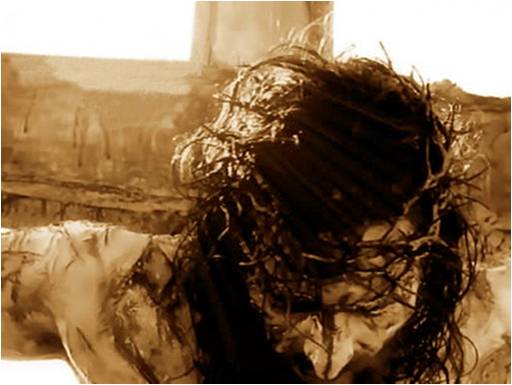
Hebrews 4:14-5:11
Our Great High Priest Forever
God wants His people to be enthusiastic about mining the truths of His Word. Remember the Bereans in Acts 17? They enthusiastically studied the Word daily! Do you wonder if they got up every morning thinking about what they would study and learn from the Word that day? ![]() We can be enthusiastic about studying the book of Hebrews. It elevates our faith in Christ with its focus on His current ministry as our Great High Priest. Our study now takes a major step forward and we need to be ready with our study tools to dig deep like the Bereans (Acts 17:11)! Hebrews 5 will introduce us to the major theme of Jesus Christ as our High Priest. After the book’s third warning in Heb. 5:12-6:8, chapters 7-10 will provide a thorough presentation of the finished work of Jesus Christ on the Cross – rich doctrinal truth crucial to our salvation faith!
We can be enthusiastic about studying the book of Hebrews. It elevates our faith in Christ with its focus on His current ministry as our Great High Priest. Our study now takes a major step forward and we need to be ready with our study tools to dig deep like the Bereans (Acts 17:11)! Hebrews 5 will introduce us to the major theme of Jesus Christ as our High Priest. After the book’s third warning in Heb. 5:12-6:8, chapters 7-10 will provide a thorough presentation of the finished work of Jesus Christ on the Cross – rich doctrinal truth crucial to our salvation faith!
You can compare our exercise in God’s Word to doing physical exercise. If we want to play soccer or some other demanding sport, we need to prepare months ahead with various exercises and practicing drills and strategy. If we just jump into the game unprepared, we’ll be in for a lot of pain. Just the same when approaching Bible study – we need to know how to use the Bible and resource tools, be exercised in researching and thinking through the text. Otherwise, we’ll find ourselves defeated after a five-minute attempt at study. We suggest that you aim for having a “good” Bible study session (30-40 min.) at least once a week. Click here to see a “Living the Word” article about different ways we have God’s Word in our life. Also, for Bible Study Tools, I recommend the material provided by Precept Austin.

REVIEW! This would be a good point in your study of Hebrews for you to go back to Session 1 of our Hebrews study and review the outline chart to see where we are in the organization of the book. Also, take the time now to read through the WHOLE BOOK, which is important in order for you to understand and remember the truths you are learning!
In the outline chart, note the central section of Hebrews is chapters 7-10, which elaborates the doctrine of Jesus Christ as our High Priest. Heb. 4:14-5:10 lays the foundation for that section and provides the third warning which addresses the “dull” or shallow Christian and how easily they can be led astray and become ineffective Christians, stuck in immaturity.

The High Priest
As we move to this next section of Hebrews, the writer is now prepared to explain in detail the greatness of Jesus Christ as our High Priest. In many tangible ways, the truths of Heb. 7-10 are like the blinding light that God has been moving mankind towards since Adam and Eve’s fall into sin. The victorious Messiah![]() , promised by God at that early moment in man’s history, has now come as the God-man Jesus, and having provided forgiveness and redemption by His blood on the Cross, is now risen from the grave and sits in heaven on the right hand of the Father as our High Priest. Unless you are an Old Testament Jew, your appreciation for who the High Priest was and what his place was in your worship of God would be minimal. There has not been sacrfices or a High Priest in Judaism since 70AD when the Second Temple was destroyed by Rome.
, promised by God at that early moment in man’s history, has now come as the God-man Jesus, and having provided forgiveness and redemption by His blood on the Cross, is now risen from the grave and sits in heaven on the right hand of the Father as our High Priest. Unless you are an Old Testament Jew, your appreciation for who the High Priest was and what his place was in your worship of God would be minimal. There has not been sacrfices or a High Priest in Judaism since 70AD when the Second Temple was destroyed by Rome.
The High Priest was a major development in God’s revelation to man regarding how we can have a relationship with Him. God had already revealed to Abraham that a man could be declared righteous by his faith in God and His Word (Rom. 1:19; 5:1-11; Phil. 3:9). The practice of blood sacrifice was introduced with Cain and Abel as a requirement for man to agree that God requires shedding of blood in order for Him to forgive us of our sin. Then, with revelation to Moses of the Tabernacle and its guidelines and practices, the role of the High Priest was introduced beginning with Aaron. He was to be God’s intercessor, the one who would lead the Jews in their relationship with and worship of God – he was their Mediator between God and man. He was set apart from the rest of Israel, only he could enter the Holy of Holies on Yom Kippur to offer the sacrifices that would cover his own sin (Exo. 30:10) and the sins of the people (Lev. 16; Num. 3:5–10). He stood between the presence of God inside the sanctuary and the ordinary  Israelites outside. He alone, on the Day of Atonement, took the blood of the sacrificed goat and brought it into the Holy of Holies and placed it on the Mercy Seat on the top of the Ark, thus atoning for the peoples’ sins for another year so that they would not be destroyed. The High Priest facilitated the Law revealed to Moses, and ovesaw all the sacrifices and functions of the Tabernacle (later the Temple).
Israelites outside. He alone, on the Day of Atonement, took the blood of the sacrificed goat and brought it into the Holy of Holies and placed it on the Mercy Seat on the top of the Ark, thus atoning for the peoples’ sins for another year so that they would not be destroyed. The High Priest facilitated the Law revealed to Moses, and ovesaw all the sacrifices and functions of the Tabernacle (later the Temple).
The writer of Hebrews has already alluded to what has been accomplished in Christ as our High Priest. Hebrews 2:17-18 speaks of His being made like His brethren, still completely God, but also completely man. This was so that He could be our “merciful and faithful” High Priest, including His His suffering on the Cross in order to understand our being tempted by sin (compare what Paul said about this in Phil. 2:5-8). It is understandable that the writer now challenges us to put our complete confidence in Jesus Christ, not only as our Savior but also as our High Priest. Jesus “sympathizes” with us in our struggle with sin – He was God and could not sin, but He was also Man and was able to experience the temptation of sin. As we proceed in Hebrews, we will see that Jesus is superior not only to Angels and Moses, but also to Joshua and Aaron himself, the original High Priest.
Today, with our study and understanding of the New Testament, we know that the OT sacrifices were a preliminary picture of the sacrifice that Jesus Christ would suffer on the Cross. In biblical terms, God accepts the blood of Christ as payment for the penalty of our sin (propitiation). The Bible faithfully records the events surrounding Jesus Christ being resurrected from the dead after His death on the Cross, and we know He returned to His Father in heaven to be seated at His right hand. “Therefore, He had to be made like His brethren in all things, so that He might become a merciful and faithful high priest in things pertaining to God, to make propitiation for the sins of the people.” (Heb. 2:17). Hebrews 7-10 focuses on the accomplishments of Jesus Christ as He ascends to the throne and reigns as our Great High Priest and how that impacts us in our Christian life.
![]() Bible Study Journal
Bible Study Journal
A review of the teachings about Christ as our Great High Priest as presented in Hebrews is possible with these references which show how He is qualified and established to minister to us as our High Priest. Jesus Christ is:
-
- Human and divine – Heb. 2:17; 3:1
- Sympathetic – Heb. 4:14, 15
- Devinely appointed – Heb. 5:5
- Eternal – Heb. 6:20
- Sinless – Heb. 7:26
- Exalted – Heb. 8:1; 9:11; 10:21

One good way to have an effective Bible study session is to spot an important key word and look for every occurrence of the word in the book you are studying. You can use a concordance (possibly in the back of your study Bible) to find all of the occurrences. Then you consider each verse where you find the word and make notes about what the verse adds to what you know about the word.
Then & Now
In Hebrews 5, the writer takes on the viewpoint of the normal Jewish listener who has grown up with the worship centered on the Jerusalem Temple, back then led by the High Priest, but now this person has accepted Christ as Savior and is a part of small local church family. The fact of the matter is stated in Heb. 4:14-16 – now we have a Great High Priest, alive in heaven after facing temptation as a man, able to sympathize with  us, so draw near! The typical Jew would struggle with that claim until they understood that Jesus was the Promised Messiah and He had suffered death on the Cross and was now resurrected and ascended back up to heaven. The writer of Hebrews now goes on to speak about the distinctions between the human priest found at the Jerusalem Temple and the risen Lord Jesus Who now sits at the right hand of the Father (1 Pet. 3:2). The writer wants us to “come boldly” before the throne of God (Heb. 4:16), and now we can understand why we can be bold.
us, so draw near! The typical Jew would struggle with that claim until they understood that Jesus was the Promised Messiah and He had suffered death on the Cross and was now resurrected and ascended back up to heaven. The writer of Hebrews now goes on to speak about the distinctions between the human priest found at the Jerusalem Temple and the risen Lord Jesus Who now sits at the right hand of the Father (1 Pet. 3:2). The writer wants us to “come boldly” before the throne of God (Heb. 4:16), and now we can understand why we can be bold.
Heb. 5:1-4 underscores the limitation that back then, the human priest had to make atonement for his own sin. The only honor or position he has is that whichGod has given him (verse 4). Jesus Christ on the other hand now has inherited His position after the order of Melchizadek, declared to be a priest eternally (a great truth repeated by the writer in Heb. 6:10; 7:17, 21, 24, 28). The psalmist originally made this inspired declaration (Psa. 110:4) but no other NT writer quoted this truth until the writer of Hebrews, who (again inspired by God) quotes it three times and alludes to it another eight times in Heb. 5-7. This truth however is the anchor to the faith we have in Jesus as our Great High Priest. Psalm 2:7 and 110:4 emphasize that the Son of God would take on the role of High Priest and Deliverer of God’s plan for Redemption.
Heb. 5:5-11 then goes on to declare the qualifications for Christ, Who is now “Better”, He is our Supreme Great High Priest. This great truth reaches back to Jesus’ ancestry to Abraham and the role Melchizedek fullfilled in God’s plan for the Messiah. God Himself declared His approval of Jesus Christ’s designation (Heb. 5:5-6) as the God-Man, demonstration of His in-depth compassion (Heb. 5:7-8), and the holy calling of God placed upon Him (Heb. 5:9-11). (This expositional outline is drawn from class notes with Dr. Donald Launstein.) As the writer mentions the deep truths of Melchizedek and Abraham, he is led to bring the reader face to face with the issue of “lazy” Christianity, being immature and “dull of hearing”, which is the next warning passage of Hebrews to be covered in our next study.
![]() Bible Study Journal
Bible Study Journal
-
-
- Test out that “Key to Bible Study” above — use this list of references where “priest” is mentioned in Hebrews. Write down 2-3 words of each use and note in your Journal your thoughts from each verse about what you learn about Jesus’ priesthood:
- Hebrews 2:17; 3:1; 4:14-15; 5:1, 5, 6, 10; 6:20; 7:1, 3, 5, 11, 17, 21, 26; 8:1, 3-4; 9:7, 11, 25; 10:11, 21; 13:11
- Heb. 4:16 states that we obtain “mercy and grace”. How would you distinguish between these two important words? Why are they both important to our Christian faith? How does Eph. 2:4-5 help to understand this truth?
- Notice in Heb. 4:16 the engaging challenge the writer lays before us – “let us hold fast our confession”! This is actually the first of 12 verses in Hebrews with this “let us” challenge. For another good Bible study exercise, take a look at each of these verses and see what we are challenged to do and why: Heb. 4:1,11,14,16; 6:1; 10:22, 23,24; 12:1, 28; 13:13, 15
- Have you thought about a Key Verse for the book of Hebrews? Could it be Heb. 4:16??
- As you complete your read-through of the book during this session, please note that our focus will now move to Hebrews 5:11-6:8 and the writer’s warning about a Christian who is indifferent, lazy, or calloused in his faith. This passage contains one of the most debated passages of the Bible, some suggesting it allows for a Chrisitian to lose his salvation (which we know conflicts with clear Bible teaching and which we will make clear is not what is taught). Ask God to give a clear view of what He wants you to learn from these verses in preparation for the next session.
- Test out that “Key to Bible Study” above — use this list of references where “priest” is mentioned in Hebrews. Write down 2-3 words of each use and note in your Journal your thoughts from each verse about what you learn about Jesus’ priesthood:
-



